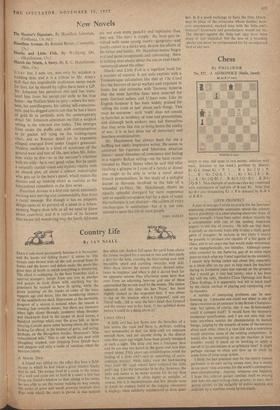Chess
By PHILIDOR No. 127. .1. AIZIKOVVICZ (Haifa, Israel)
NV I HIE (6 men)
WHITE to play and mate in two moves: solution next week. Solution to last week's problem by Morra: Kt-Q 4, threat Kt x P. I . . . R x Kt; 2 Q P.
1 B >: Kt; 2 Q-K 7. 1 . . . Kt x Kt; 2 R >: B.
1 ...K Kt; 2Q-B3,I ...R-Kt 5;2Qx B.1... R-R
2 Q-B 3. Nice example of multi-sacrifice key combined with exploitation of' half-pin of B and Kt. Note that Kt-B I also threatening Kt x P is defeated by R-R 6 or B-B 6.
GRIM PROSPECT
A year or two ago I wrote an artiele for the Spectator expressing considerable scepticism about the science- fiction possibility of a chess-playing electronic brain of master strength; I have been rather shaken recently by a conversation with one of the leading American experts in this line of country. He tells me that there is already an electronic brain able to play a really good game of draughts; he reckons in two years it would be possible to produce one capable of a fair game of chess, and in ten years one that would make mincemeat of me (metaphorically, not literally). Although some- what consoled by the flattering gap of an extra eight years to reach what my friend regarded as my standard, I cannot help feeling rather sad about this, especially as a timid offer on my part to help teach the machine' during its formative years was rejected on the grounds that I would get it into bad habits; once it has been fed with the rules, Modern Chess Openings and Basic Chess Endings, it is apparently best left to teach itself by the classic method of playing and ruminating over its blunders.
A number of interesting problems can be seen
looming up. I presume one could not wheel in one of these creatures as an assistant in the British Champion- ship, but (given, of course, that it was British-made) could it compete itself? It would have the necessary residential qualification, and I am not sure that our rules anywhere restrict the championship to human beings; judging by the remarks of some of the entrants about each other, there is a view that such a restriction would eliminate some of the existing competitors. It would also be interesting to see the machine in time trouble; would it speed up its working or apply a cut-off to its calculations at an arbitrary time? It might perhaps manage to cheat and slow up its clock by some form of long-range action, I think the best practical step for the merely human performer is to start saving money now, buy a model in ten years' time and enter for the world's correspond- ence championship. Anyway, whatever else happens, I hope this infernal gadget confines itself to playing and does not start writing chess articles; to have one's games subject to the indignity of public analysis and criticism by a machine would be too much.


































 Previous page
Previous page